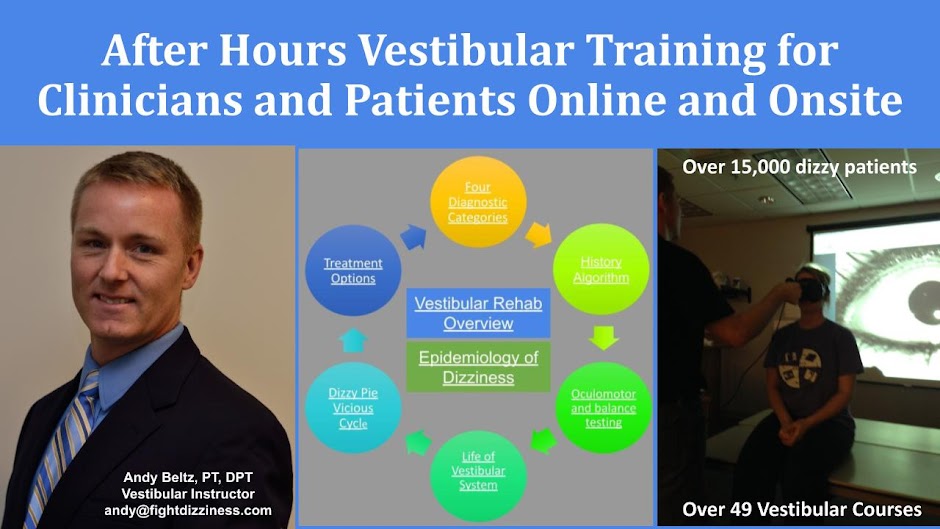Vertigo is not a diagnosis it is a symptom. The Vestibular Disorders Association uses the following terminology to define vertigo: Spinning or whirling sensation; an illusion of movement of self or the world.
I have witnessed individuals with intense nystagmus describe their dizziness as other sensations than spinning. The presence of nystagmus often represents either a central or peripheral vestibular disorder. I see people all the time who have vestibular disorders (with nystagmus) and they describe their dizziness as lightheadedness, off balance, funny in the head, etc. Many clients I see who have been told they have vertigo do not truly have vertigo.
I have had clients with the diagnosis of Benign Paroxysmal Positional Vertigo present with typical BPPV nystagmus and describe their dizziness as lightheaded...not vertigo.
Showing posts with label dizziness. Show all posts
Showing posts with label dizziness. Show all posts
Tuesday, June 7, 2011
Do you have to feel spinning to have vertigo?
Tuesday, May 24, 2011
What can I do to battle my dizziness mentally?
I have many clients who battle anxiety and depression with dizziness. I once heard it said that we are born with two innate fears: loud noises and fear of falling. I don't have a source to confirm this information, but I find it interesting that both fears have to do with the inner ear.
I recently had a client, who is hypersensitive to sensory input (touch, sound, images/light and movement) ask what she could do to battle her dizziness mentally. I was so happy she asked. Without mental and spiritual training it is very difficult to successfully battle dizziness.
In short, because I knew the cause of her dizziness, I was able to instruct her that she first needed to transform her way of thinking about her dizziness. She needed to welcome the dizziness instead of try to hide from it. She needed to convince herself that it was good to be dizzy.
I recently had a client, who is hypersensitive to sensory input (touch, sound, images/light and movement) ask what she could do to battle her dizziness mentally. I was so happy she asked. Without mental and spiritual training it is very difficult to successfully battle dizziness.
In short, because I knew the cause of her dizziness, I was able to instruct her that she first needed to transform her way of thinking about her dizziness. She needed to welcome the dizziness instead of try to hide from it. She needed to convince herself that it was good to be dizzy.
Saturday, April 30, 2011
Imagination, Memory and Dizziness
Have you ever heard someone say, "That makes me dizzy just looking at it" (In reference to a picture of individuals on the edge of a cliff) or "That makes me dizzy just thinking about it" (In reference to a discussion about climbing up a ladder or riding an elevator to the top of a skyscraper)?
How is it that someone can become dizzy just looking or thinking about a height related topic? Click here to learn more...
How is it that someone can become dizzy just looking or thinking about a height related topic? Click here to learn more...
Friday, April 15, 2011
People over 85
seem to perceive dizziness differently than people under 85. Now, I don't mean to generalize. All individuals are unique. However, I do believe that our senses change the older we get. Therefore, when the same individual is 65, they may perceive nystagmus as "spinning". However, when they grow to be 85, they may perceive nystagmus as "floaty" or "off balance."
Subscribe to:
Posts (Atom)
